Teams, tales and tips – a guide to the local game
Despite almost overwhelming difficulties, football has survived, in fact thrived, in Derry, second city of Northern Ireland. After more than a decade out of the senior game, Derry City have been competing with teams from south of the border in the League of Ireland since 1985.
The club’s home, the revamped Brandywell Stadium, stands just past the Free Derry Corner and the Bloody Sunday Monument, major landmarks relating to The Troubles. Civil strife saw Derry City forced to play home games in Coleraine from 1971, before being reduced to Saturday-morning football.
Success post-1985 was swift. With Derry regular qualifiers for Europe since winning a memorable domestic treble in 1989, the Brandywell has hosted the likes of Benfica, Gothenburg and Paris Saint-Germain. A £7 million stadium redevelopment in 2017 reflects the positive effects of an almost unbroken run in the top flight for over 30 years.

Football has been played at the Brandywell since 1900. Alongside stands Celtic Park, home of Derry’s GAA team, and where soccer team St Colomb’s Court played from 1894. Founded in 1886, St Colomb’s competed in the County Derry Cup, twice winning it in the early 1890s.
From 1894, a St Colomb’s Hall, later known as St Colomb’s Hall Celtic and then Derry Celtic, monopolised the tournament, renamed the North West Cup. These were all the same club, under different guises, although the relationship with St Colomb’s Court isn’t clear. A Derry Hibernians also lifted the regional trophy three times.
The Irish League and Cup were dominated by teams from Belfast, although a Derry Olympic were admitted in 1892 and Derry Celtic in 1900, the same year that they moved into the Brandywell.
For reasons also not entirely clear, Derry Celtic were voted out of the Irish League in 1913 after finishing in the relegation zone.

Even Institute FC, formed in 1905 as the Presbyterian Working Men’s Institute, where the later influential Derry City manager Billy Gillespie started out as a teenager, seem to disappear from the record books after 1912.
For 15 years either side of the Partition of Ireland, Derry had no senior soccer team. Formed in 1928, Derry City received senior status a year later, joining the Irish League, which had separated from the south in 1921.
From the start, the club was based at the council-owned Brandywell, later failing to buy Celtic Park, which became the local home of Gaelic football.
Adopting red-and-white stripes in honour of manager Billy Gillespie, who had enjoyed a 20-year career with Sheffield United after leaving Institute, Derry proved themselves cup specialists. A decade later, Derry made their European debut but The Troubles soon put paid to any kind of senior football until 1985.

After years of delicate negotiation, Derry managed to join the football set-up in the south, crowds flocking to the Brandywell to see the Candystripes take part in the inaugural First Division, City winning the second tier a season later. In scenes that would have hardly seemed possible in the 1970s, Benfica, Gothenburg and Paris Saint-Germain all came to the Brandywell as Derry embarked on more than a dozen European campaigns.
Institute, meanwhile, adopted senior football in 1999 and began to develop their ground at Drumahoe, a village a couple of miles south-east of Derry. With major funding from Sport Northern Ireland, a new main stand was built as ’Stute gained promotion three times to the top flight, to take on the top clubs from Belfast. The North West Senior Cup, the same trophy won by St Columb’s Court a century ago, also found its way to Drumahoe several times.
Unfortunately, the aptly named Riverside Stadium suffered severe flooding in 2017 and the ground remains out of commission to this day. Playing most home games at the Brandywell, ’Stute achieved another promotion to the Irish Premiership that same season and but lost top-flight status in 2020. Any return to the Riverside is now impossible, given the deconstruction order approved in June 2022.
Getting Around
Arriving in town, local transport and timings

Derry has its own airport 11km (7 miles) north-east of town. Currently Loganair and Ryanair provide links with London Stansted, Liverpool, Manchester and Scotland. A City Cabs taxi (+44 28 7126 4466) costs £11 into town.
Goldline Express bus 234 runs every 2hrs to the Buscentre in town, journey time 30mins. Other bus journeys require a 10min walk to Longfield, Eglinton, where you can pick up the Nos.143 or 152, run by Ulsterbus.
The waterfront Buscentre is in town by the Peace Bridge, the same side of the river as the stadium. The train station is across the Foyle. The hourly service from Belfast (£12.50) takes 2hrs.
Belfast International Airport is 92km (57 miles) away. Take Ulsterbus 300a to the Europa Buscentre Belfast then Translink Goldline 212 to the Buscentre in Derry, overall journey time around 3hrs.
Translink Goldline Bus X3/X4 runs from Dublin Busáras to Derry (£11) seven times a day via Dublin Airport, journey time 4hrs.
Where to Drink
The best pubs and bars for football fans



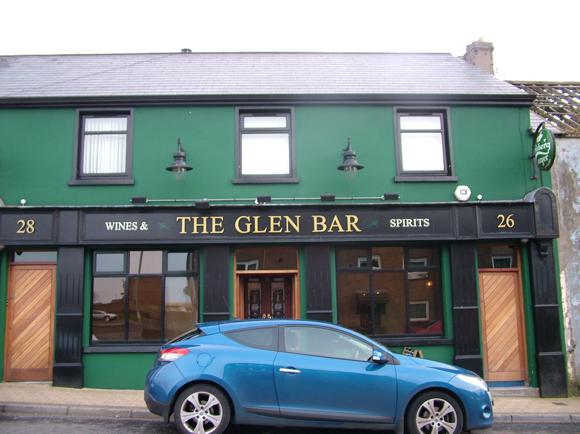
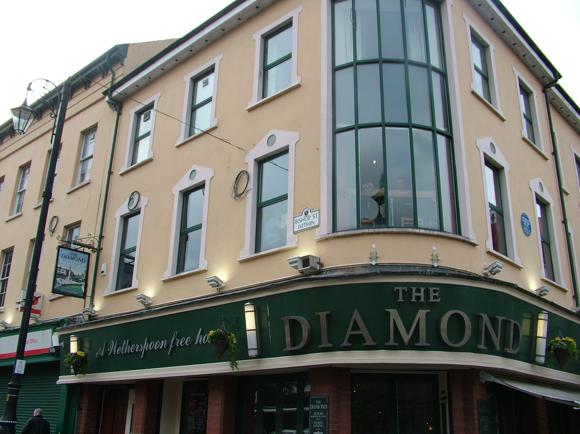

Pubs surround the Richmond Centre mall. Football is screened in one of the three bars that comprise the historic River Inn, revamped in 2016. Nearby, The Metro Bar is more contemporary and clubby, with DJs, drinks offers – and football screened when it matters.
On the other side of the mall, the Bentley is a six-bar complex, one showing matches. Formerly the Diamond Hotel, where Institute FC were formed in 1905, then a Wetherspoons pub no longer with us, Granny Annies has revived this prominent space with live music, TV sport and communal banter.
For an old-school community pub, The Derby on Great James Street is a revered spot with TV football.
Halfway between the stadium and the river, the Oakgrove Bar (88 Bishop Street), a quality spot with TV sport, live music, pool and snooker. It also sells tickets for Derry games.
Across the Foyle, near the train station, the Glen Bar (28 Dungiven Road) has become a real football haunt with two big screens and a full schedule.
Where to stay
The best hotels for the ground and city centre


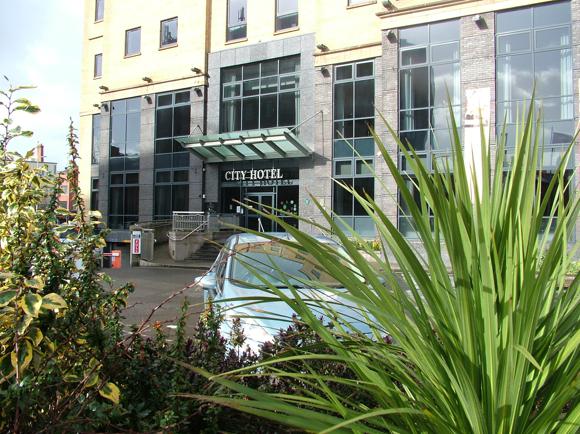

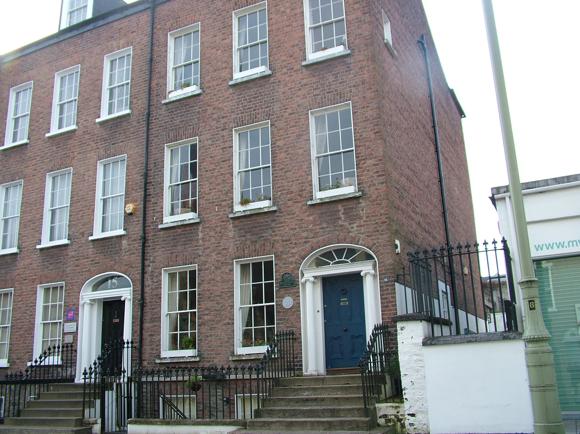

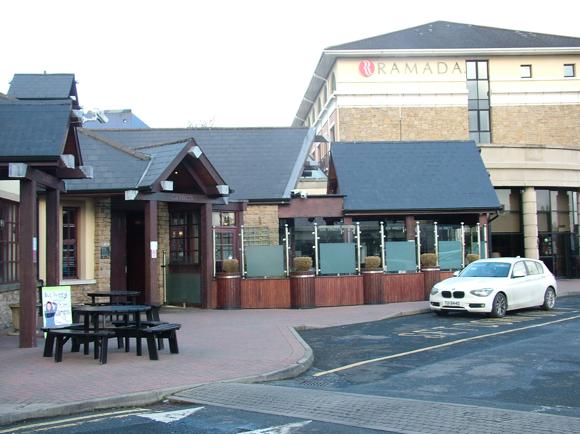

Visit Derry has a hotel database with reservations via booking.com.
The four-star Maldron is close to the bus station, with 90 rooms, a gym and sauna. Its Lyric bar shows TV football. Also nearby is superior B&B Townhouse No.8. Waterfront four-star City Hotel Derry, with a pool and gym, offers attractive weekend breaks.
Saddler’s House on Great James Street is convenient, comfortable and affordable. Breakfast is a feast. Its sister operation, Merchant’s House on Queen Street, dates back even earlier.
For something equally historic, the Bishop’s Gate Hotel on Bishop Street is a 31-room five-star with a champagne bar, cocktail bar and ballroom. Originally this was a social club for veterans of the Crimean War.
Just outside the centre Da Vinci’s on Culmore Road, the former Ramada, offers the largest bedrooms in town, a top-notch restaurant and live music in the traditional bar.
Even further out, handy if you’re with the car, the local Premier Inn is close to the main roads into town and offers free parking.


